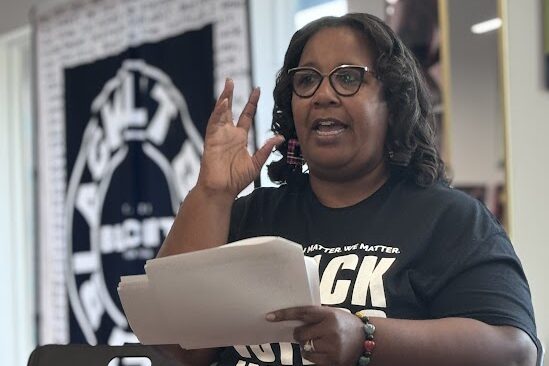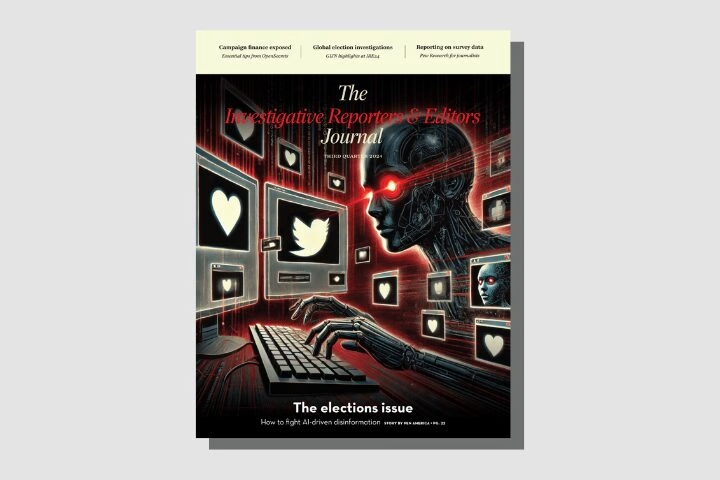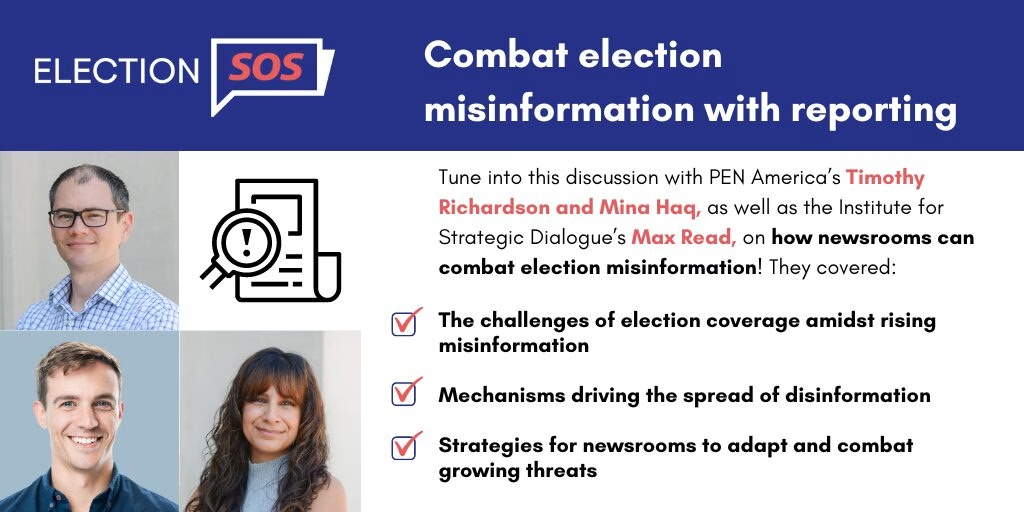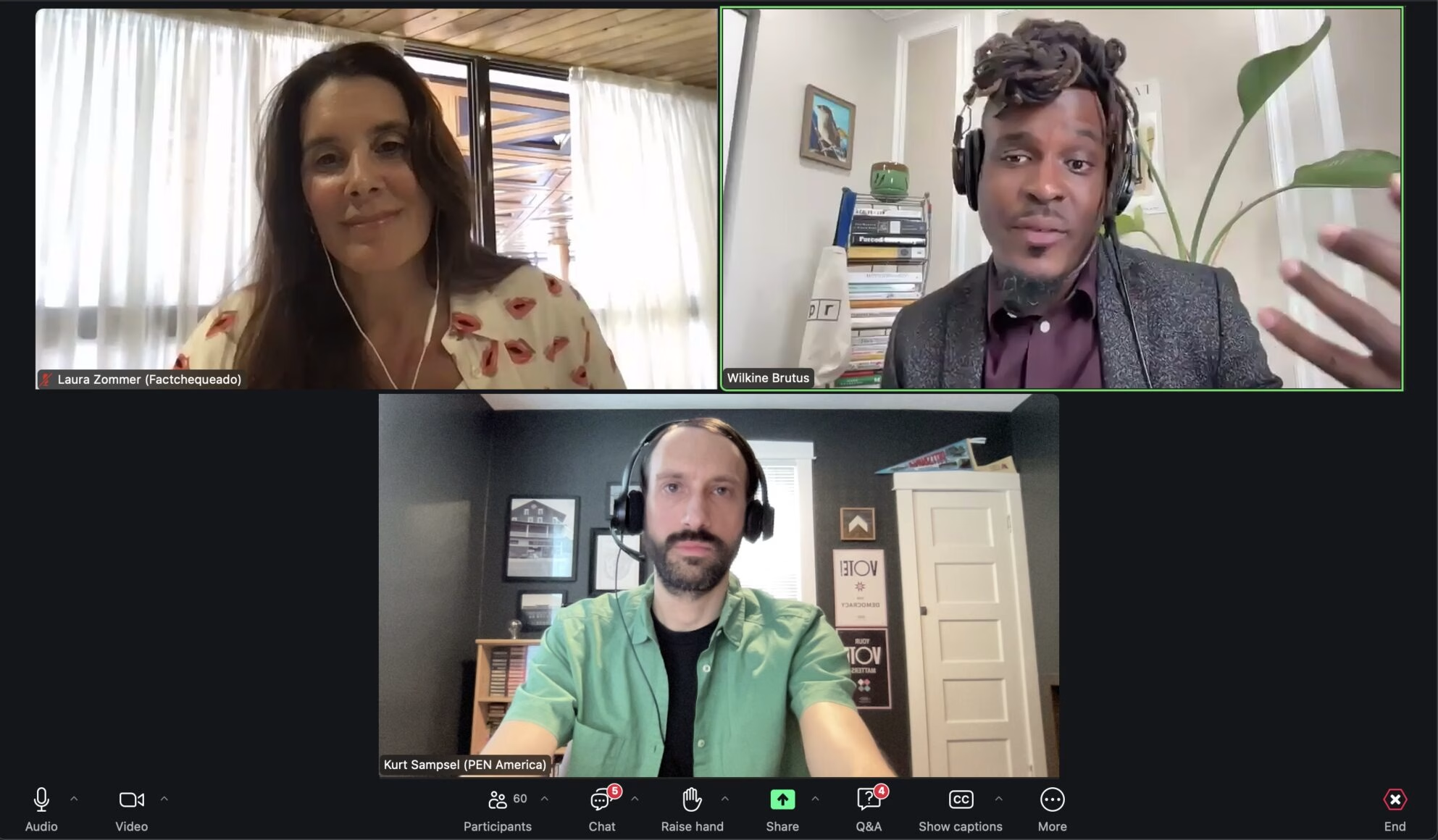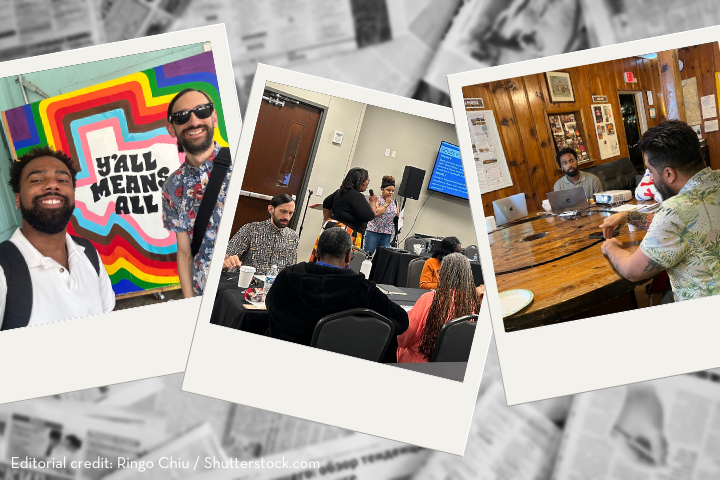This Q&A is part of a series of interviews with journalists and experts who regularly handle disinformation. The interviews will appear regularly to highlight best practices, insights, case studies and tips. Our goal is to provide a resource to assist reporters and community members through the news events of 2024.
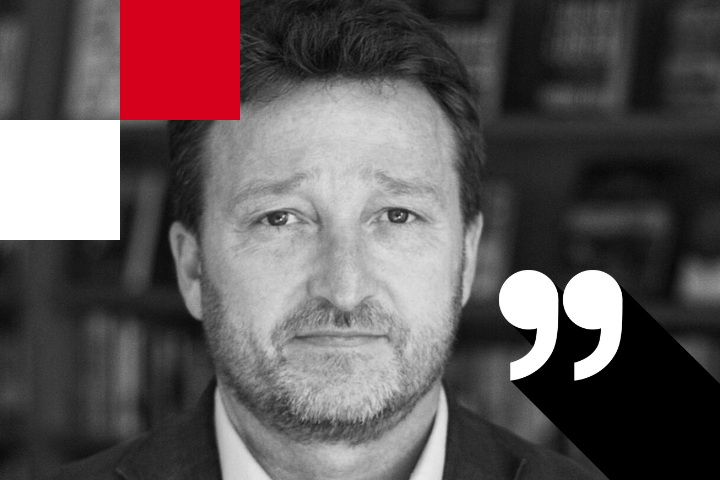
Donald Trump’s victory followed a campaign season marked by falsehoods and conspiracy theories about immigration, Kamala Harris’s credentials, the July assassination attempt on Trump, and more. PEN America wanted to dissect what role, if any, disinformation played in the outcome, and where journalists can go from here. We spoke to New York Times reporter Steven Lee Myers, who covers mis- and disinformation from domestic and foreign actors.
This interview has been edited for length and clarity.
Democrats are blaming Trump’s win on a lot of different things. It’s impossible to point to one specific factor, but how much do you think disinformation played a role in the outcome?
I think it definitely played a role in shaping the debate and the way it was framed. I’m not sure I would say it decided the outcome, but it certainly fueled a lot of the narratives that were very prevalent throughout the campaigns. There was just so much, you might call it spin or propaganda or point of view or argument, even opinion. The line with disinformation isn’t always so stark, but I think there was a lot of disinformation, and I’m speaking first of domestic disinformation, that fueled some of the arguments against both candidates. I definitely think that had an impact.
Do you think there were specific narratives that were more salient with voters, or was it a collection of things?
A good example to maybe unpack a little bit is the narrative about Haitian immigrants in Ohio eating cats and dogs, which was thoroughly discredited as an assertion, and yet that narrative, as both the president-elect and his running mate suggested at different points, resonated with people who were legitimately concerned about immigration as an issue. That’s the kind of subtle effect it can have – if it touches a nerve and emotional response that motivates people to vote, even if it’s not true. That was a very powerful example of how disinformation and misinformation plays a role in how people view candidates.
Another good example is the whole question of cheating. Somehow the election is rigged, and if it were rigged by the Democrats, as many Republicans seem to believe, Trump would not have won. It was interesting how quickly that narrative dropped – though not entirely, because now people are looking at some of the undecided races and saying there are still shenanigans happening. But I think it was pretty well established that a free and fair election was run, and those narratives nonetheless persist, even now.
You wrote before the election that “facts matter less than feelings” in today’s world. How do you think journalists can exist in that world and continue to do their jobs and reach voters who maybe don’t even care if they’re being fed disinformation, as long as it propels their worldview or fears?
Honest journalists just have to keep doing honest journalism. By that, I mean reporting, seeking truth, seeking facts, seeking balance and perspectives, and trying to inform people. I don’t think there’s a crisis in journalism in that sense. There’s still a lot of great journalism being done in this country, even by organizations that some might consider partisan or leaning to the right or left, one way or the other.
The bigger crisis is that there’s not as much of a market for journalism, and that journalism requires work and it requires resources. And what you have, instead, is the head of one platform saying, “You are the media now,” suggesting that somehow your opinion expressed on X or Facebook or any other platform is the equivalent of doing good journalism, which it’s not. Which is not to say there aren’t great experts and even journalists who use these platforms to get their messages out and use other kinds of new media, like Substacks and so forth.
But it’s not journalism to just respond, retweet, post your opinion about things. The sad fact is that more and more people are getting their view of the world, or at least what news they digest, through that prism of somebody else’s opinion, as opposed to a news organization that’s trying to sort through all of that and curate it into something resembling the truth.
I guess it is a much bigger problem than what journalists can do in their day-to-day lives. It’s much more about the business model.
I would encourage journalists to just keep doing it. I spoke to a class in California, a journalism class at a college, and I encouraged them to not give up. They smartly asked, “Is there a future in journalism?” And of course, I think there still is, and I think the industry, in the broadest sense, needs to figure out how to reach those people who maybe aren’t subscribing to the major national newspapers or who aren’t watching cable television anymore, but are getting their news through this new media.
How do you navigate interviewing people who might be falling into these rabbit holes of disinformation or who don’t trust the media? How do you gain their trust enough to have them talk to you?
By and large, I think a lot of people who share this view of the media being completely corrupt, or that it’s not telling the truth, or that it’s bought off by corporate interests, generally haven’t spent much time with journalists. And they’re wary of them – fair enough. But usually when you meet somebody who’s doing the job of journalism, you find that they’re genuinely curious, hopefully they’re respectful of your point of view. It’s not for me to go and convince somebody of something they should think. That’s not our job. As journalists, we’re supposed to go and find out what they think and accurately reflect that. Sometimes just doing that is enough to convince people that, “Oh, well, it’s not what I expected from The New York Times,” because they have these preconceived notions, which they’ve been told over and over for decades now. It didn’t start with Donald Trump and fake news.
The best thing we, as journalists, can do is try to reach out to people and hear them and reflect their views. They may still be mad that you didn’t put everything they said in the article, because you can’t, but by and large, if you treat people well, they’ll understand that what you’re doing is fair-minded.
I want to pivot to disinformation from foreign actors. Why do you think Russia became so brazen in spreading false information this time around? And what, if anything, can be done about that?
There are a couple of factors there. Russia and the Soviet Union before this have long considered themselves to be in a sort of ideological fight with the West. That diminished for a couple decades, almost a quarter century, depending on when you want to end it, when Russia did end its own censorship at home and opened up the country to a great degree. In the last decade or so, particularly since the war in Ukraine began initially with the annexation of Crimea in 2014, Russia has seen itself in a much more dire conflict with the West than had been true in the last couple of decades. For that reason, they kind of turned on some of the old systems they had, especially when it came to spreading propaganda and intelligence activities – active measures, they call them in the field, of working to sway opinion, not just in the United States, but also Europe, Africa, Latin America, to try to show that Russia is right. That has become amplified even more with the full-scale invasion of Ukraine in 2022. That’s a big difference from even the 2020 election, but certainly from 2016, when they did try to intervene, mostly in the beginning to discredit Hillary Clinton’s candidacy and what they expected to be her presidency. With Trump in office, I think there was this hope on the part of the Russians that they would have better relations, and they didn’t. And then all of this led to the invasion.
Since then, I think Russia really feels a sense of an existential fight. They will do whatever they can to discredit the United States as a functioning democracy, both to sow chaos here in the United States but also to present the United States as a failing role model for the rest of the world.
You wrote in October: “In hindsight, the efforts to challenge the results four years ago were haphazard, even farcical, compared with what is happening now.” Obviously, the election-denial operation isn’t doing exactly what we thought it would be doing right now. But why do you think those operations got so much more sophisticated? What contributed to that?
They became more organized and they had resources put behind them. And this was a deliberate strategy on the part of a number of Republican officials: the attorneys general in Missouri and Louisiana who brought lawsuits against the (Biden) administration, charging the administration – which, by the way, wasn’t in power yet – of fixing the 2020 election; working with the platforms to censor conservative critics online; and from there, through various lawsuits that shut down some of the groups that monitored this kind of disinformation, especially about elections, and then all the way through the investigations in Congress. There was a lot of pressure put on people who were trying to challenge this, and that had an effect of letting the message spread.
It’s really striking to me that four years ago after the election, there was broad agreement that these accusations that the election was stolen were not substantiated. Even if, politically, some people kept saying that, it never held up in court. Somehow, I think that even after the shock of the January 6 attack, they managed to rewrite that whole narrative – that in fact, there was extensive fraud, there still is extensive fraud, and it turns out there’s not if their candidate wins. That tension has been there. It’s been mounting, honestly, and it’ll be interesting to see if it persists beyond this election and leads to changes either in election laws or every four years, or every two years, you just see a new round of people doubting the outcome of the election. If we, as a society, can’t find a consensus on our elections, that’s very dangerous for democracy.
Is there anything I didn’t ask that you want to touch on, specifically about election disinformation?
One of the things that I’ve really been thinking a lot about is the fractured media state that we live in. I’m privileged to work for the New York Times, which is a great news organization. And there are a lot of great news organizations in America, but there are fewer than there used to be. And they don’t have as much reach. More and more people are not getting news from these organizations. To me, it really feels like it’s not just a partisan issue. It’s a matter of people not having access to information that makes an informed electorate. We need to figure out a way to do that. And honestly, I’m not sure I have one. A lot of people I talk to are kind of, I don’t want to say Pollyanna, because they’re well-intended, but they say we just need more libraries, and we need media literacy, and we need people to reach out and talk to their neighbors more. All of those are great ideas, but are kind of not practical. So how do we restore a sense of polite political discourse in society? All we can do is live by example, but sometimes I think that the polite people in the room aren’t the ones being heard over those shouting.
Steven Lee Myers is a national security and foreign correspondent for The New York Times covering misinformation and disinformation from the San Francisco Bureau. He has previously reported from more than 70 countries and territories around the world. He is the author of a biography of Vladimir Putin, “The New Tsar.” published by Alfred A. Knopf Books in 2015 and in paperback by Vintage Books in 2016.

